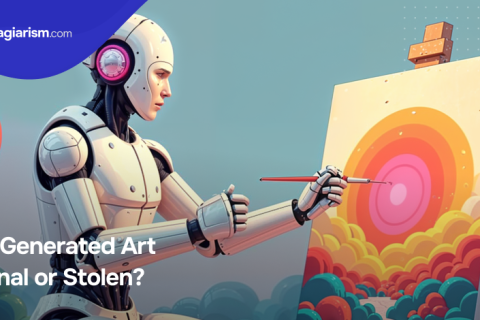Is Plagiarism a Theft or Progress?
13 Jan 2019

How Ideas Spread Owing to Plagiarism
What is plagiarism, in fact? Is it always a banal theft, or is it still necessary for the development of human civilization? Is it moral, in your opinion, to develop or improve someone else's ideas, sometimes without even asking permission from the author himself? Is it even rational to plagiarize? It’s risky. It’s misleadingly rewarding. You run the risk of incurring the wrath of the gods (if you believe in them), the authors themselves, and sometimes even the law enforcement agencies.
- What is Plagiarism?
- Plagiarism in Science
- Plagiarism in Music
- Plagiarism in Literature
- Useful Plagiarism
- Continuity of Ideas
Yes, the usual plagiarism, from the moral point of view, is pure theft, since the origin of this word is not quite ambiguous. The word “plagiarism” comes from the Latin “plagio” – to steal. In fact, plagiarism is copying or using someone else's knowledge, and appropriating their authorship. Legally, this word is usually applied to other people's works of literature, art, science, and different kinds of invention. Therefore, most people refer to plagiarism as something evil and degrading, but today we will look at the other side of plagiarism, without which, in general, there would be virtually no scientific, technical or cultural progress. Let's view the main directions of human knowledge one by one, revealing the attitude to plagiarism in these areas nowadays.
The cases of plagiarism and copying other people's ideas can be found in any sphere, not just in business, as you might think. For example, plagiarism is widespread in science because scientists act similarly to businessmen, adopting, copying and developing ideas from each other or stealing them even from nature itself. It can be said that many modern scientists unscrupulously copy ideas from living nature and embody them in contemporary technologies. You may not believe, but more than 70% of all adequate scientific inventions were somehow copied from nature. What is interesting, 20% of inventions are the results of ordinary mistakes made by scientists as well as fortunate accidents that led to the ground-breaking discoveries. It can also be a thoughtless search through all available possibilities, and only 1-5% of science reflects innovation, independent inventions by individual scientists. Even then it is very debatable how this 1-5 % of innovative knowledge comes to people's heads, but today we will not discuss this long, confusing and even somewhat esoteric topic. The essence is that without plagiarism and continuity of knowledge, science is simply impossible, otherwise, each scientist would have to start all over again. Almost all famous scientists were somehow accused of plagiarism. Do you think your widely revered Einstein produced merely original ideas? Alas, he was accused on the cusp of his career, while he was working with other people's patents and developments. In any case, science is not done from scratch, it is always based on the knowledge of others.
Not only the scientific community is guilty of plagiarism. This violation is typical for all spheres of human activity. Musicians also frequently sue each other for plagiarism. Music plagiarism is not only a modern trend, as even the most distinguished classical musician and composer Amadeus Mozart himself wrote, "I never made the slightest attempt to create something original". So to be ingenious means to be able to ingeniously reprocess, supplement, and adopt the experience and activity of other people, improving it. Games, films, computer programs, all ideas here have been duplicated ten and sometimes even a thousand times. The same thing has been represented with small external changes; new technologies greatly help to implement those alterations easily. In reality, the plot of every second movie is similar to the one you have already watched. It’s difficult to judge resembling music and films, to define whether you deal with shameless plagiarism, theft, and degradation, or the idea development and the desire to perpetuate it, as there are also good films with similar ideas and low-quality ones.
Plagiarism in literature is even worse; it probably occurs more often in all the diversity of its forms. Someone is inspired by another person's deafening success and a writer's talent, which does not stop him from becoming quite rich and famous. That is, in fact, an envier steals from other people's stories and life situations anyway. Unsurprisingly, among such brilliant plagiarists and masters of the deepest rewriting, there are almost all the modern well-known authors of books and articles. They "peacefully" steal everything, starting from popular psychological stories to Einstein's theory of relativity. Someone like Stephenie Meyer scribbles every month, “creating” a new novel or detective story. Such pseudo-authors simply embellish any life situation that has happened to them or their friends. A plagiarist even doesn’t need to be inspired to write something as he gracelessly rewrites works by genuinely skillful authors.
Plagiarism has been logically deemed unethical, but there is also a tricky kind of intellectual appropriation that can be even considered useful. The most ingenious and creative ideas are frequently imitated in its core. The ancient knowledge is constantly recycled and this way it is preserved and passed down to next generations. Knowledge, which has long been considered unpopular and irrelevant, has been forgotten by most people. At the same time, even the neglected knowledge often turns out to be helpful, it's just that our contemporaries do not usually delve into all these ancient and seemingly obsolete texts. Therefore, a sort of justifiable plagiarism is when people aim to revive ancient knowledge, adapting it to the modern times, rewriting it in more comprehensible words, and yes, not mentioning the exact author because the names of old writers and philosophers are often unknown. There’s nothing criminal in bringing back old proven wisdom to life. The knowledge tested for strength and usefulness for many centuries supposedly becomes a common legacy of human civilization.
However, one way or another, being honorable doesn’t involve cheating. If you know the source, don’t copy it blindly and mention its author. If your aim is to spread the ancient knowledge, you should do it like a genuine researcher. When you investigate, you search and you find the information you want to reveal, and you don’t intend to plagiarize at all. So there’s a thin boundary between the intention to retell and the failure to credit the valuable sources. It’s essential to revive old knowledge but it’s indecent to copy the efforts of others. Even if you dive into some old manuscript of an anonymous author, you should mention the century it was written in, as well as present your investigation as not an independent creation but your interpretation of perennial intellectual heritage. The main aspect you should never forget is to Cite Your Sources. Proper referencing can save the whole situation, and such continuity of ideas will be of great benefit to people, especially in such spheres as science, music, arts, and literature. A minor detail becomes the essence. A minor detail will protect you from becoming a thief or imitator. Expressing your intellectual possibilities and amalgamating them with the wisdom of the past will also contribute to the progress of spiritual knowledge and encourage profound individual development.






